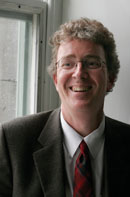Entre Nous with Martin Grant, Dean of the Faculty of Science
Entre Nous with Martin Grant, Dean of the Faculty of Science McGill University
User Tools (skip):
Entre Nous with Martin Grant, Dean of the Faculty of Science
Undergrad research and public outreach

Martin Grant moved into the office of the Dean of the Faculty of Science on June 1, taking the torch from Alan Shaver, who had served as dean for a decade. In his research, Grant studies the formation and properties of complex structures, such as crystals and flames. Most of these structures are formed at the nano- or micro-scale by non-equilibrium processes, which makes them especially difficult to understand and impossible to control or tune. By comparison, taking the helm for the faculty should be straightforward.
Q: One of your first initiatives as dean involves creating new undergraduate research opportunities? Why is this important?
A: The quality of our undergraduates has been fundamental to keeping McGill so strong, and we should bring these students into more contact with our faculty — especially our new young researchers.
A hundred years ago at McGill, Ernest Rutherford was working on the transmutation of elements with Harriet Brooks, who was first his undergraduate and later his graduate student. Early in her studies, she was directly involved in the cutting-edge and very controversial research for which Rutherford and his collaborator Frederick Soddy won the 1908 Nobel Prize. Today's McGill students can also do cutting-edge research with professors, but finding a research position is catch-as-catch-can. Honours students can do research, and some students find work on summer research projects, but these activities take place in senior years. I think all students want to interact with professors — and vice versa.
What concrete plans are there to help undergraduates get involved with research?
First of all, on September 30, we are holding our first Undergraduate Research Conference. It will be a poster presentation held in conjunction with Homecoming activities, which will give alumni and students an excuse to talk to one another. On the same day we will announce the opening of our new Office of Undergraduate Research, which will coordinate research opportunities for students. It is easy to connect physics students to physics professors, but students want to explore different areas — such as research in physics one summer, and in earth and planetary science the next — and our department structure mitigates against that. They need the doors to be opened for them, which is what the Office of Undergraduate Research will do by helping connect students to professors across the faculty.
We are also looking at creating a three-credit elective research course that students could take at any year level. The hook would be that you could only take it once in one department — so you could do it in chemistry one summer and, say, biology the next. If you take three research courses, at convocation you would get a special certificate indicating that you have this research experience.
In addition, Marta Filipski, the Science Undergraduate Society president, brought us a proposal based on an American model called "freshman interest groups." As a result, we're launching a pilot project in which a group of freshman students meet every two weeks with a professor to discuss science issues and ideas. Students will get to know each other, as well as at least one professor who will recognize them and can give them letters of reference later.
Technology transfer — taking ideas, processes and products developed in university labs to the marketplace — is an ongoing concern in science faculties across Canada. How is McGill's Faculty of Science doing in this area?
We plan to start a small office in the faculty to help professors with those stages before they get to McGill's central Office of Technology Transfer; for example, getting researchers to recognize when their research has commercial potential and then walking them through the initial steps. The problem is partly cultural, as we need more role models in this area, so we'll draw on professors who have experienced the process, as well as alumni, to help make that connection between lab research and the marketplace. Typically, a faculty member will be working with a research team and something just takes off. Usually the professor doesn't want to leave the university, so it is often graduate students who start companies, with the professor playing a role like chief scientific officer.
What of that other form of knowledge transfer — just letting the public know what is happening in scientific research at McGill?
McGill's strength is that we're a local university that is also an international university. We have to play to these strengths and make sure the local community knows about our work. We have some great outreach operations — notably the Office of Science and Society, as well as the Redpath Museum — and all the departments host public lectures. But we need to expand and diversify this outreach across the faculty. We plan to establish a Science Outreach Office that would brings news and expertise from McGill directly to the community. People on the street would love to hear about all the things that are happening in science — on breast cancer treatments, or on early stars and quasars, for instance — and we have world experts right here.
You have a reputation as something of a blues guitarist. Will your new job cut into your playing time?
No, of course not — this is a job, and I get to go home after. Roger Slee, the dean of education, is a drummer and asked me if I would play at the Faculty of Education BBQ on Thursday, September 8, and we also played for Alan Shaver's going-away party. Roger and I couldn't find a bass player who was a dean for that gig, so we brought in local blues legend Stephen Barry, and gave him an honorary deanship.

